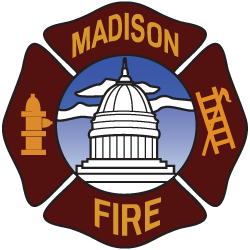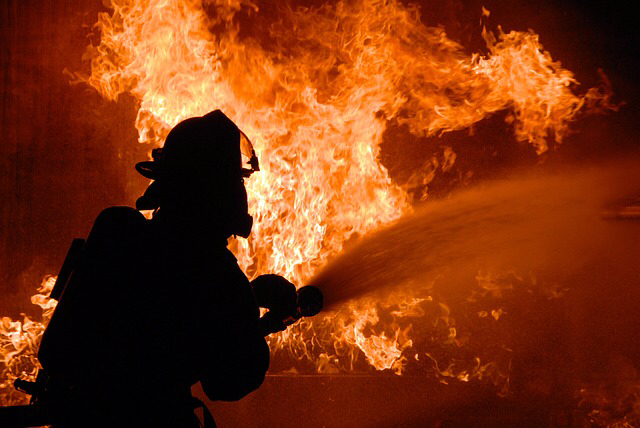Peer Support Program Offers A Helping Hand To First Responders Coping With Stress, Trauma
posted
It’s a chilling reality: First responders are more likely to die by suicide than in the line of duty. According to a study by the Ruderman Foundation, there were at least 103 firefighter suicides in 2017 in contrast to the 93 line-of-duty deaths that same year.
First responders across the country have taken note, and the Madison Fire Department is setting out to buck the trend.
A new Peer Support Initiative, endorsed by Madison Fire Department Administration and Fire Fighters Local 311, was established in the summer of 2018 to provide a confidential, supportive resource for first responders coping after a critical incident or dealing with personal or professional stress.
Twelve active and retired MFD personnel have signed on as Peer Support Members. After receiving specialized training provided by the International Association of Fire Fighters (IAFF) and the City of Madison Employee Assistance Program, these individuals are available to lend an ear— and a helping hand— to their colleagues in need.
Peer Support Members act as facilitators connecting individuals to the appropriate experts. They do not act as therapists or counselors.
Any member of the Madison Fire Department, past or present, can seek the assistance of the Peer Support Initiative. Use of the program is completely voluntary.
Meet the members of MFD’s Peer Support Initiative!
Angelo Aguirre
Firefighter/Paramedic, EMS Training Officer
With MFD Since: September 2012
Why they’re a Peer Support Member: Suicides, depression, and substance abuse are all very common in the fire and police services, as are smaller things like repetitive call demands, lack of sleep, and work-related stress affecting relationships at home. Building a team and getting a group of people together to make our peers feel more comfortable talking about these issues is important. They may not feel comfortable going to someone in a position of authority, like a Lieutenant or Chief, or to an Employee Assistance Program, where they may never have met the person they're talking to. It's important to have a peer support team so we can help make the connection between the people who are suffering and the amazing resources available. Overall, mental wellbeing needs to be the focus of our people in all ranks.
Jimmy Ahn
Lieutenant, Fire Station 8
With the MFD since: 1994
Why they’re a Peer Support Member: It's only in the past few years I've learned the importance of being able to "vent." I like analogies: Imagine my feelings as a huge beach ball. I would stuff all my feelings in this beach ball and keep them stuffed inside me. Keeping my feelings stuffed inside was like trying to keep a huge beach ball under water. The deeper I tried to stuff this beach ball under water, the harder it got. Eventually you lose control, and the beach ball comes erupting to the surface. Feelings were the same way. Often they would eventually surface, sometimes manifest themselves, and often not come out constructively. I've learned that I need to "vent" this beach ball and deflate it. Often, simply talking to someone helps me vent these feelings. I wanted to join Peer Support in case someone needed to vent and they had nowhere to turn.
This is a program to take care of our own. It was developed by our members for our members. It's one more step to help our members with the "pressures" of life.
Linnea Anderson
Peer Support Program Coordinator; Lieutenant, Fire Station 5
With the MFD since: 1999
Why they’re a Peer Support Member: Behavioral health is an important component of everyone's life. We all have "issues" at some point. We, or the people close to us, are all either currently in a crisis, just getting out of a crisis, or about to enter one. The Peer Support Team is another tool available for the MFD, our families, and retirees to ensure we all stay healthy, in all ways. It's another option for people to reach out for assistance from someone who may understand a little better. It also helps to normalize mental health issues—talk about it and realize you're not alone when it comes to family, relationship, and personal challenges.
Joe Ellingson
Apparatus Engineer, Fire Station 5
With the MFD since: October 10, 1998
Why they’re a Peer Support Member: I was most surprised to hear about the suicide rate among firefighters. We got into this career to help the public; now we need to help each other. We see people on their worst day, and we need to be there for them. At the same time, we have all the stresses everyone else has in their regular life. Then we have our job on top of that. It takes a toll. We have a lot of great resources in our city, and the Peer Support Initiative connects us to those resources.
Eddie Emberson
Retired Apparatus Engineer
With the MFD for 28 years
Why they’re a Peer Support Member: I believe the Peer Support Initiative will fill a void that has not been fully addressed. As first responders are exposed to more and more incidents, the likelihood of personal problems arising is a growing problem. Having a team or program in place to support our own and their families is a step in the right direction. Being offered a chance to give back in retirement is an honor.
Bernadette Galvez
Community Education Officer
With the MFD Since: June 1990
Why they’re a Peer Support Member: I've been with the department for 28 years now, so I've gotten to know the firefighters, their families, and to watch their kids grow up. I also know the retirees. The crews want to sit down at the kitchen table and discuss the bad calls among themselves. They're more comfortable sharing their experiences with one another than trying to relate them to someone from the outside who may not relate to the fire service and what they go through. What's nice about the Peer Support Initiative is we don't counsel, we refer. I like that. I don't want anyone to feel alone, because they're not. There are many people going through the same thing, and I empathize with them. When people feel they have to figure things out themselves, the problems get worse and they pile up. I'm not a professional, but I can help you get some help.
Mari Leslie
Firefighter/Paramedic, Fire Station 4
With the MFD since: 1993
Why they’re a Peer Support Member: We need to take care of our own people as an organization, and this is a great avenue to do that. By making us more mentally healthy, we're better equipped to do our jobs, and it helps us bond further. We're truly a family, and we take care of our family. The Firefighter/Paramedic mortality rate is horrifying, and it's been proven that departments with this program in place have fewer mental health issues than those that do not. We gotta take care of our own peeps!
Mark Miller
Firefighter, Fire Station 7
With the MFD since: 2008
Why they’re a Peer Support Member: Having a father that is a funeral director and former County Coroner, the hardest calls to go through with family and friends are those of suicide. Most of those deaths could have been prevented with early diffusion and help. What firefighters and police see and experience on a day-to-day basis is not normal, and those calls can have a snowball effect that cause mental instability over a period of years. In 2003, the Madison Fire Department went on 20,287 calls for service. Last year we went on 31,002 calls for service. This increase in numbers means members are potentially seeing more high-trauma call volumes in addition to experiencing sleep deprivation. While some mental health struggles may require professional help, others may diffuse simply by talking over a cup of coffee. As Chief Dan DeGryse from the Chicago Fire Department said at his FDIC keynote speech, “In an effort to stay connected, reach out to your co-worker, your friend, your spouse, your son, daughter, Mom or Dad, or someone here while you are at FDIC. Ask them the simple, yet powerful, question, ‘How are you doing?’’’
Richard Mulhern
Retired Lieutenant
With the MFD for 25 years
Why they’re a Peer Support Member: With the number of Firefighters/EMS providers committing suicide starting to rival line of duty deaths, it's time we aggressively face this challenge like we've tried to increase firefighter safety on the fire ground.
Laura Prom
Firefighter/Paramedic, Fire Station 5
With the MFD Since: 2012
Why they’re a Peer Support Member: I believe that the Peer Support Initiative is important due to the nature of our job and work schedule. They inherently come with various stressors that can build over time and lead to issues that can impact both work and home life. Simply put, the Peer Support Initiative is just people helping people. We take care of each other and our families because we are all in this profession and life together. In this profession, we help the public every day, and with this initiative we can do more to help each other every day.
Mike Terry
Firefighter, Fire Station 6
With the MFD since: October 19, 2009
Why they’re a Peer Support Member: During my time in the Marine Corps I gained a unique perspective in regards to mental health issues and saw first-hand how vital a strong support network would be. In our profession we are becoming increasingly aware of the struggles of PTSD and burnout. I think it's crucial to be involved at the peer level in order to build and maintain the camaraderie essential for creating a safe place for us all to share our struggles, hardships, and coping mechanisms. In doing so, I think we will be stronger and better equipped as a department to do our jobs effectively and safely.
Bill White
Retired Firefighter/Paramedic
With MFD for 27 years
Why they’re a Peer Support Member: I'm interested in peer support for several reasons: To maintain a connection with the MFD, which is an important part of my life; I want to be able to help someone if I can; I have an understanding of some of the stressors that come with the job; and I've been helped by members, and I'd like to return the favor to others, whether they're active or retired.

